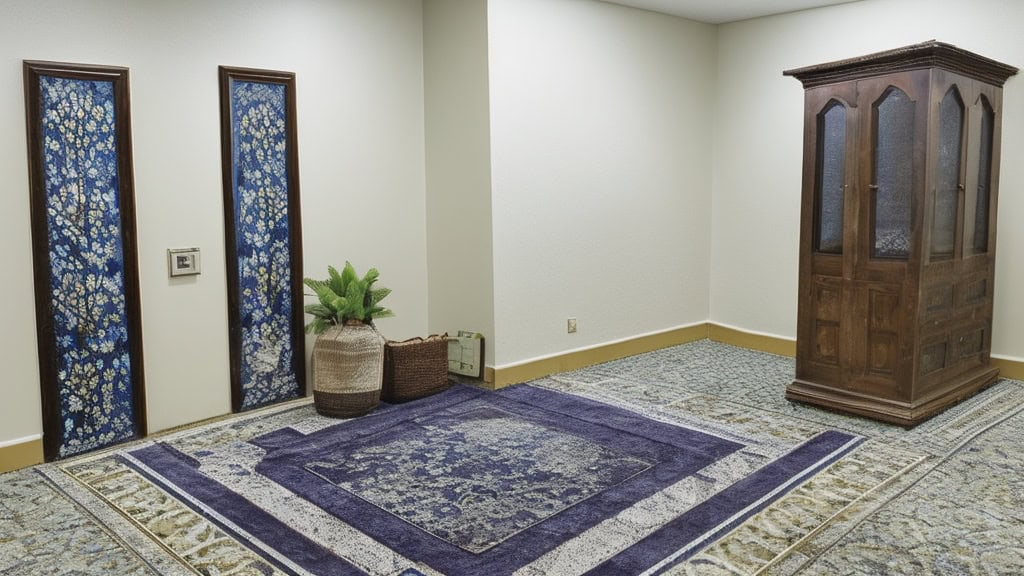
Balancing Tradition and Modern Inclusivity
Discover how balancing tradition and modern inclusivity with Christian business leadership can harmonize your faith and workplace culture. Uncover actionable strategies from biblical teachings to boost employee engagement and customer loyalty. Learn the secret to practicing Christian love and humility while respecting diverse perspectives.
Christian Business Leader’s Unlikely Bond With Hindu Employee Changes The Workplace Forever
It was the summer of 2015, and the sun was setting over the vast, golden fields of central California. I was in the car, heading to a series of site visits after a long day at the office. As a Christian business leader, it was important to me to foster a respectful and inclusive environment while staying true to my faith. Little did I know that this drive would lead to a profound and life-changing conversation.
As a design engineer on my team, the mentee riding with me was a talented individual whose faith was something that had caught my attention. We ended up talking about faith, and to my surprise, the employee showed they practiced Hinduism. The revelation caused a subtle tension to fill the air, as the primary beliefs between Hinduism and Christianity are dramatically different. We both felt the weight of this revelation, but instead of allowing it to drive a wedge between us, I made a conscious decision to approach the situation with an open heart and mind.
I began asking big, open-ended questions to understand their perspective. The emotions and sincerity in their voice as they shared their journey through Hinduism was palpable. As the employee spoke about their faith, rather than being defensive or closed off, they shared parts of their faith where our belief systems overlapped. It was a poignant moment, as I realized that despite our differences, we could understand that both of us wanted what was best for the team and for our clients, even though we had core principles we didn't agree on.
During that drive, we formed a bond. It was a moment of deep understanding, compassion, and connection. We both came to see each other through a lens of appreciation for wanting to know more about one another. These conversations continued in subsequent meetings, and we found common ground in our shared desire to serve our clients with excellence and honor the hard work of the teams we worked with.
While I didn't convert this employee to Christianity during the drive or in subsequent meetings, I know that the door is open and their curiosity has been raised. Maybe one day I'll hear that this employee has questioned their own faith and look for the hope we have in Christ. But even if that day never comes, I cherish the profound connection and understanding that was forged through our conversations. It's a testament to the power of empathy, open-mindedness, and the willingness to engage in meaningful dialogue. Our journey together showed me that regardless of our differences, mutual respect, and compassion can bridge even the widest of divides. It is a lesson I will carry with me for the rest of my life.
Unlock the Secrets of the Pharisees and Sadducees to Transform Your Business Leadership

As a Christian business owner, pursuing excellence in the workplace is not merely about revenue generation, but also about embodying the principles of your faith. Achieving this requires a thoughtful balance between staying true to your beliefs and fostering an environment that respects and includes diverse perspectives. This balance was a challenge even in biblical times, notably for the Pharisees and Sadducees, who struggled with strict adherence to tradition amidst a changing spiritual landscape. By reflecting on their experiences and applying these lessons to modern-day workplaces, you can create a respectful and inclusive environment that aligns with your Christian values.
Learn from the Pharisees and Sadducees
The Pharisees and Sadducees were prominent Jewish sects during the Second Temple period, known for their strict interpretation of the law and their influential social and political roles. Their challenges mainly revolved around their rigid adherence to traditions and failure to embrace the transformative message of Jesus Christ. For a business owner, learning from their experience highlights the importance of adaptability, open-mindedness, and compassion in leadership.
Recognize and Respect Diverse Religious Perspectives
Firstly, it is critical to recognize and respect the diverse religious perspectives of your employees. Data suggests that a significant percentage of the American workforce identifies with a faith different from Christianity or may subscribe to secular beliefs. According to a 2020 Pew Research Center study, about 70% of adult Americans identify as Christian, which means that 30% of your potential workforce could adhere to other faiths or none at all. Acknowledging this reality is essential to fostering an inclusive workplace.
Strategies to Implement Inclusivity:
1. Establish Clear Policies: Formulate and articulate clear policies that promote religious inclusion. These policies should address religious accommodations, such as flexible scheduling for religious observances and dietary requirements. Clearly communicate these policies to all employees to prevent misunderstandings and demonstrate your commitment to inclusivity.
2. Encourage Open Dialogue: Create avenues for open dialogue about religious diversity. This can be done through regular cultural competence training sessions or facilitated discussions. Such initiatives can help dispel myths and foster mutual understanding. It is crucial to approach these conversations with empathy, laying the groundwork for a more respectful and united workplace environment.
3. Lead by Example: Demonstrate respect for all faiths through your actions. Make it a point to recognize and, when appropriate, celebrate significant religious events of all faiths in the workplace. Celebrating diversity in this manner shows employees that their beliefs are valued, which can increase their engagement and loyalty.
4. Neutral Spaces: Designate neutral spaces within the workplace where employees can practice their beliefs. This might include prayer rooms or quiet areas for meditation. Providing such amenities can be a powerful testament to your respect for religious diversity. However, fostering a respectful and inclusive environment doesn’t mean compromising your Christian values. On the contrary, it means embodying the very essence of Christian love and humility. Reflect on Jesus’s interactions with the Pharisees and Sadducees; in his teachings, he stressed the importance of compassion, humility, and service to others (Matthew 23:11-12).
5. Lead with Love and Compassion: Approach interactions with employees with the same love and compassion that define your faith. When making decisions that impact your workforce, consider how those decisions reflect the Christian commitment to care for others. This might involve showing understanding during personal struggles or offering support in times of need.
6. Ethical Business Practices: Uphold the highest standards of integrity in your business operations. Ethical business practices are a cornerstone of Christian values and reflect positively on your faith. This includes fair treatment of employees, transparency in dealings, and accountability.
7. Inclusive Language: Be mindful of the language used in the workplace. While it is appropriate to express your faith, ensure that your language is inclusive and not alienating. Phrasing matters, and focusing on shared values like integrity, compassion, and teamwork can bridge gaps.
...creating a respectful and inclusive environment while staying true to your Christian faith is not about diluting your beliefs but amplifying the core tenets of love, respect, and service

Ultimately, creating a respectful and inclusive environment while staying true to your Christian faith is not about diluting your beliefs but amplifying the core tenets of love, respect, and service. By reflecting on the lessons from the Pharisees and Sadducees and embracing a modern approach to workplace diversity, you can ensure a harmonious and thriving business environment. This careful balance will lead to stronger employee engagement, better customer relationships, and a workplace that truly reflects the compassionate spirit of your faith.
Take the next step towards fostering a compassionate and thriving workplace that embodies your Christian values. Discover how our Business Integrity Matters online community can equip you with the tools and support needed to lead with integrity and inclusiveness. Join us today at https://businessintegritymatters.com/membership-signup/ and see the transformative impact it can have on your business.
May God Richly Bless You and Your Business! We'd be honored if you shared with your crowd.Unleash the Power of God’s Blessings in Your Business with Bradley Waldrop – A True Authority in Business Integrity Matters
As a founding board member of Jacob’s House and The Joseph Initiative, a steering committee member for University of California, Riverside’s A.Gary Anderson Graduate School of Management, and the winner of the fastest growing small business inside a leading international professional services business, I have the knowledge and experience to help you navigate the challenges of business integrity matters. My role as an author, small group study leader, change agent, and non-profit board member, along with my past experience as a men’s ministry director and successful business leader, uniquely qualifies me to help Christian business owners honor and glorify God in their businesses.
It’s time to take your business to the next level by aligning your goals with God’s blessings and honoring Him through your business practices. I will inspire you to tap into the power of God’s blessings and provide you with practical strategies to integrate faith-based principles into your business operations. Together, we can make a positive impact in the business world while honoring God in all that we do.






Leave a Reply